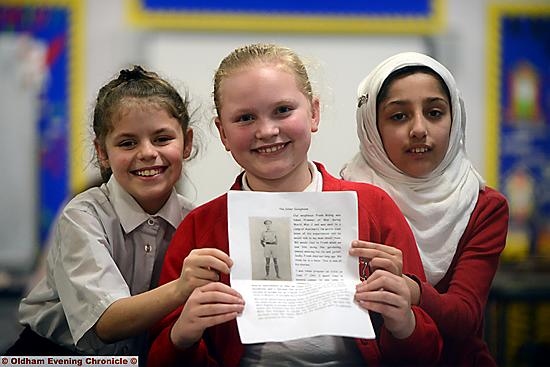Lyndhurst pupils are first with the news
Date published: 24 December 2014

Year 6 pupils at Lyndhurst Primary School have entered a journalism competition and one of their stories is featured in a national schools newspaper. Left to right, Natasha Usher, Rachel Brooks, Alisha Imran.
A GROUP of pupils at an Oldham primary school could well be giving the Evening Chronicle a run for our money as they have been out and about in the community gathering stories for a national journalism competition.
Year six pupils at Lyndhurst Primary School have entered a competition organised by children’s newspaper First News.
The competition was part of the events to commemorate the 75th anniversary of the beginning of WW2 and invited children to send in an article to be included in a special edition of the newspaper.
So the youngsters got their pens and notepads out, interviewed elderly neighbours and family friends and sent their reports to First News.
Collette Donnelly, year 6 teacher at Lyndhurst Primary School, said: “Children like to see that they are writing for an audience and what better audience than all of your classmates seeing your work in a newspaper?
“We have studied World War Two in History lessons and I thought it would be good to encourage them to speak to people with first-hand experience.
“The children really enjoyed talking to people about their experiences and they talked fondly about the older people they had met.
“They told me about their photographs and medals and said they liked to listen to the stories. They each wrote one article for the newspaper but submitted drafts beforehand.”
Pupil Rachel Brooks may just be a natural, as her story has been shortlisted to feature in the special World War Two edition of the children’s paper. She tells the story of her neighbour Frank Riding who was taken prisoner of war during World War Two and was sent to a camp in Auschwitz.
Ms Donnelly said: “Rachel’s story is amazing and heartbreaking.”
Frank, who sadly died this year, told Rachel of how he and others were sent musical instruments in a prisoner of war camp in Hamburg so they could form a band.
He played tenor saxophone in the band and they all played loudly while other prisoners dug an escape tunnel.
Many of his friends managed to escape but the majority were recaptured and returned to the camp.
He took his saxophone with him to many other prisoner-of-war camps including his last one at Auschwitz where he and his friends used music as an escape from the atrocities going on around them.
He told Rachel earlier this year: “The sights, sounds and smells of this place haunt my dreams even now and I will wake up drenched in sweat.”
As the war came to an end the German soldiers did not know what to do with Frank and his friends so they marched them to Munich – which took 16 weeks through deep snow.
Some way into the treacherous walk, Frank and his band mates realised they had to leave their beloved instruments behind if they were to carry on and so they did.
Frank added: “My beloved silver saxophone was left at the side of the road amongst the snow and ice. It had saved my life in more ways than one and it will always be priceless to me.”




